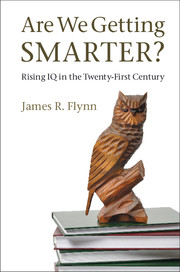Book contents
- Frontmatter
- Contents
- List of Figures
- List of Tables
- List of Boxes
- Acknowledgments
- 1 Opening windows
- 2 IQ and intelligence
- 3 Developing nations
- 4 Death, memory, and politics
- 5 Youth and age
- 6 Race and gender
- 7 The sociological imagination
- 8 Progress and puzzles
- Appendix I IQ trends
- Appendix II Capital cases and comparing the WAIS-III IQs of various nations
- Appendix III Adult/child IQ trends and bright taxes/bonuses
- Appendix IV Gender and Raven’s
- Appendix V Wonderful paper on causes of Raven’s gains
- References
- Subject index
- Name index
6 - Race and gender
Published online by Cambridge University Press: 05 November 2012
- Frontmatter
- Contents
- List of Figures
- List of Tables
- List of Boxes
- Acknowledgments
- 1 Opening windows
- 2 IQ and intelligence
- 3 Developing nations
- 4 Death, memory, and politics
- 5 Youth and age
- 6 Race and gender
- 7 The sociological imagination
- 8 Progress and puzzles
- Appendix I IQ trends
- Appendix II Capital cases and comparing the WAIS-III IQs of various nations
- Appendix III Adult/child IQ trends and bright taxes/bonuses
- Appendix IV Gender and Raven’s
- Appendix V Wonderful paper on causes of Raven’s gains
- References
- Subject index
- Name index
Summary
Race and gender IQ differences arouse strong emotions and therefore I excluded them from What Is Intelligence? I did not want critical assessment of my views on intelligence lost in a welter of acrimonious debate. Look at what happened to The Bell Curve, which was 90 percent about other subjects and debated as if it were 90 percent about race.
I have offered my case that the black/white IQ gap is probably environmental in origin elsewhere (Flynn, 1980, 2008), and will not repeat it here. However, much of this book preaches the message that differences between Wechsler subtests are central to interpreting IQ trends. The following will, I hope, show that these subtest differences are not central to the race and IQ debate, at least not for the reasons given by thinkers such as Jensen and Rushton. As a bonus, we may enhance our understanding of why WISC subtests differ in a variety of ways: not only in the size of the black/white performance gap, but also in terms of their g-loadings, heritability, and sensitivity to inbreeding depression.
- Type
- Chapter
- Information
- Are We Getting Smarter?Rising IQ in the Twenty-First Century, pp. 132 - 158Publisher: Cambridge University PressPrint publication year: 2012



